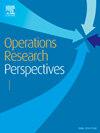Simplicity or flexibility? Dual sourcing in multi-echelon systems under disruption
IF 3.7
4区 管理学
Q2 OPERATIONS RESEARCH & MANAGEMENT SCIENCE
引用次数: 0
Abstract
Disruptive events like the COVID-19 pandemic have exposed supply chain vulnerabilities. This study focuses on dual sourcing as a resilient strategy and examines a stochastic, single-item, multi-echelon, multi-period, dual sourcing inventory system under backorders. In each echelon, the decision-maker faces a dual-sourcing situation wherein the item can be replenished from a slow regular supplier or a more expensive and faster emergency supplier. We compare two inventory management policies: the Dual-Index Policy (DIP) and the Tailored Base-Surge (TBS) Policy, while also investigating how various factors influence policy effectiveness and the role of demand disruptions. Our findings indicate that the TBS policy generally relies more on upstream suppliers than the DIP. However, in scenarios of high demand uncertainty, upstream suppliers are seldom used. DIP is more effective for short networks facing sudden demand drops, whereas TBS excels when experiencing demand spikes.
简单还是灵活?在中断情况下多级系统中的双源
COVID-19大流行等破坏性事件暴露了供应链的脆弱性。本研究的重点是双重采购作为一种弹性策略,并考察了在缺货情况下的随机、单项目、多级、多时期的双重采购库存系统。在每个梯队中,决策者都面临双重采购的情况,即物品可以从速度慢的正规供应商或更贵、更快的应急供应商处得到补充。我们比较了两种库存管理政策:双指数政策(DIP)和量身定制的基础激增(TBS)政策,同时也研究了各种因素如何影响政策有效性和需求中断的作用。我们的研究结果表明,TBS政策通常更依赖于上游供应商而不是DIP。然而,在需求不确定性高的情况下,很少使用上游供应商。DIP对于面临突然需求下降的短网络更有效,而TBS在经历需求峰值时表现出色。
本文章由计算机程序翻译,如有差异,请以英文原文为准。
求助全文
约1分钟内获得全文
求助全文
来源期刊

Operations Research Perspectives
Mathematics-Statistics and Probability
CiteScore
6.40
自引率
0.00%
发文量
36
审稿时长
27 days
 求助内容:
求助内容: 应助结果提醒方式:
应助结果提醒方式:


